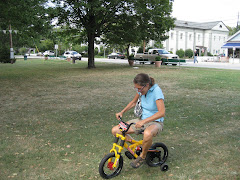 My students' first in-class essay was on how they experience music everyday, and I wrote and gave them this essay as a model.
My students' first in-class essay was on how they experience music everyday, and I wrote and gave them this essay as a model.
Listen to the whir of the humidifier, the bark of the dog, the clip-clop of the horses. Everyday music surrounds me even before I begin to practice my cello or go to rehearsal. I hear music from the minute I wake up and hear the British accent of the man on the
I experience the everyday music of other people, ranging from a peculiar accent as the English man on the radio’s to the chatter of my colleagues and students in the halls all the way to the literal music my colleagues make at orchestra rehearsals on Tuesday and Thursday nights. Voices are as distinguishable as timbres of instruments; the cello sounds more like that human voice, while a clarinet rolls and rises out of this realm. I hear people yelling, whispering and whining, giggling, crying and griping, and those sounds are as much music to me as are the delicate sounds of the high violins or the sturdy squawks of the bassoons.
Everyday hear the machine music of train wheels, bus gears, car horns and more domestic daily drones of dishwashers, dripping coffee makers, or the clicks of the gas stove lighting. When I get to school, I experience the pens bickering in and out as students mindlessly play during class; I experience the sounds of trays sliding on the rails in the cafeteria, the phones ringing in my office or the squeaks of the drawers on my desk.
But I don’t just experience music from the outside everyday because I experience the music that I make as well. I play or practice my cello, pulling my bow across the strings to create the vibrations and sounds – long, sustained notes, short, staccato notes, or even plucked pizzicato notes. I can hear the strings beneath my fingers on the black, firm fingerboard as I position my hand for intonation and accuracy. Sometimes my bow disobeys me, and the sound I make is incompatible with the note on the page. I play out of tune, or I play out of rhythm, and I must go back and play again and again until I am right, until I am confident.
Sometimes I wonder if other people feel the sound the way I do. Perhaps musicians have more sensitive ears, taking in the things that other people experience as mere buzz or static. Sometimes I hear a voice or an accent that makes me cringe because it is not musical, but nobody else seems to be bothered by it. Maybe there are disadvantages to experiencing music in sounds; there are simply too many in a day to make a beautiful symphony. When the sounds stop being music and become cacophony, I return home where the humidifier hums, the dog gives a welcoming bark, and the horses clip-clop back into the barn for the night.




No comments:
Post a Comment